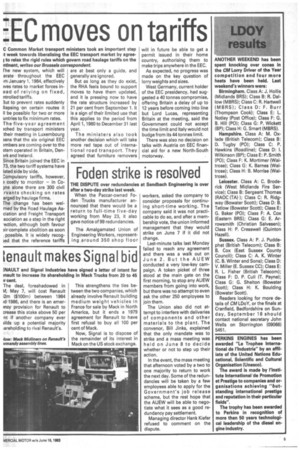EEC moves on tariffs
Page 7

If you've noticed an error in this article please click here to report it so we can fix it.
C Common Market transport ministers took an important step t week towards liberalising the EEC transport market by agree; to relax the rigid rules which govern road haulage tariffs on the ntinent, writes our Brussels correspondent.
[he new system, which will erate throughout the EEC ■ rn January 1, 1984, effectively Ives rates to market forces inead of relying on fixed, ntrolled tariffs.
3ut to prevent rates suddenly Raping on certain routes it II be possible for two or more untries to fix minimum rates. The five-year agreement ached by transport ministers their meeting in Luxembourg aans that the six original EEC ambers are coming over to the stem operated in Britain, Denark and Ireland.
Since Britain joined the EEC in 73, the two tariff systems have isted side by side.
Compulsory tariffs, however, a costly to monitor — in Come alone there are 300 civil rvants checking on rates arged by haulage firms.
The change has been welmed by the Road Haulage Asciation and Freight Transport sociation as a step in the right -ection, although both favour 3ir complete abolition as soon possible. It is widely recog;ed that the reference tariffs
are at best only a guide, and generally are ignored.
But as long as they do exist, the RHA feels bound to support moves to have them updated, and it is pressing now to have the rate structure increased by 21 per cent from September 1. It is a sign of their limited use that this applies to the period from April 1,1980 to December 31 last year.
The ministers also took another decision which will take more red tape out of international road transport. They agreed that furniture removers will in future be able to get a permit issued in their home country, authorising them to make trips anywhere in the EEC.
As expected, no progress was made on the key question of lorry weights and sizes.
West Germany, current holder of the EEC presidency, had suggested a 40 tonnes compromise, offering Britain a delay of up to 12 years before coming into line but Lord Lucas, representing Britain at the meeting, said the Government could not accept the time limit and Italy would not budge from its 44 tonnes limit.
There was also no decision on talks with Austria on EEC financial aid for a new North-South motorway.








































































































